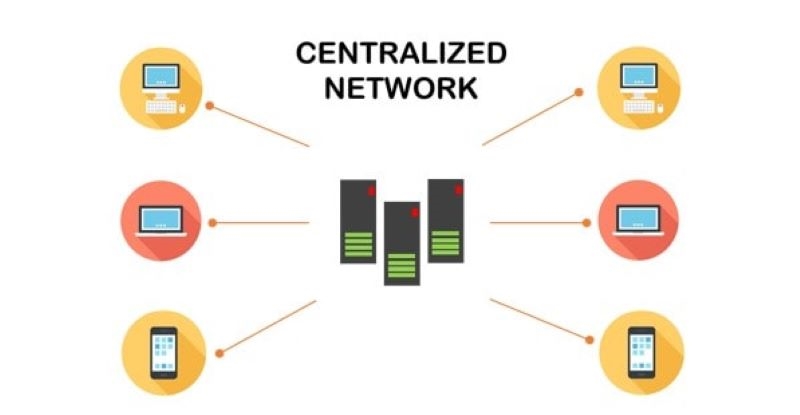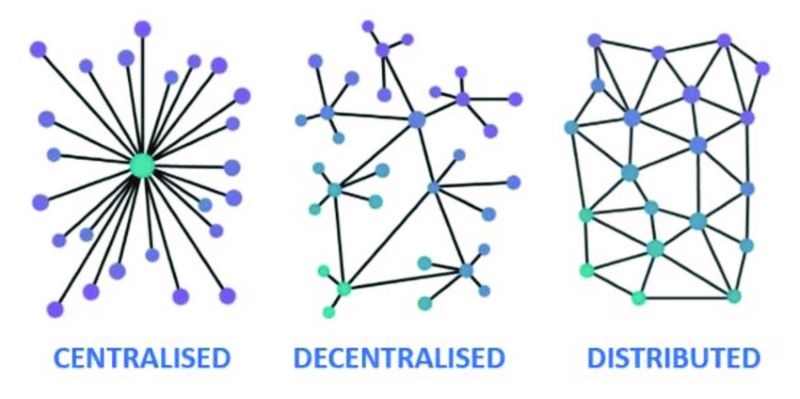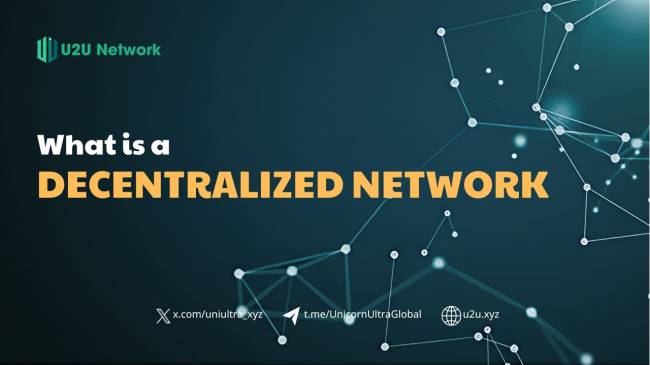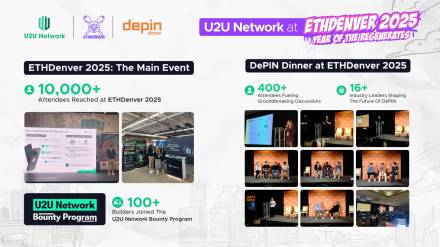Curious about what is a decentralized network? Imagine a future where the internet isn't dominated by a handful of tech giants. Picture having complete ownership and control over your data. This is the promise of decentralized networks. Join us as we delve into this realm where authority is dispersed, privacy is safeguarded, and creativity thrives. Explore the concept of decentralized networks and how they're reshaping our online interactions and connectivity.
Table of Contents
Understanding What is a decentralized network
Definition
Decentralized networks are systems composed of interconnected nodes, each operating independently without a central authority or control.

Core Principles
Distributed Architecture: Decentralized networks utilize a distributed architecture where data, resources, and decision-making authority are spread across multiple nodes rather than being concentrated in a single location. This distributed nature enhances resilience and reduces the risk of system-wide failure.
Peer-to-Peer Communication: Nodes in a decentralized network communicate directly with each other without relying on intermediaries or central servers. This peer-to-peer communication allows for efficient sharing of information and resources among participants.
Consensus Mechanisms: Consensus mechanisms are protocols or algorithms that enable nodes in a decentralized network to agree on the validity of transactions or changes to the network. These mechanisms ensure that all nodes reach consensus without the need for a central authority to validate transactions, thereby maintaining the integrity and security of the network.
Comparison with Centralized Networks
|
Feature |
Centralized Networks |
Decentralized Networks |
|
Control |
Controlled by a single entity or authority. |
Control is distributed among multiple nodes |
|
Security |
Single point of attack vulnerability. |
Less vulnerable to single point of attacks due to distributed architecture. |
|
Resilience |
Prone to system-wide failures if the central entity fails. |
More resilient to failures as no single point of failure exists. |
|
Decision-Making |
Central authority dictates decisions |
Decisions are made collectively through consensus mechanisms. |
|
Scalability |
Limited scalability due to centralized infrastructure. |
Potentially higher scalability due to distributed nature. |
|
Efficiency |
Efficient in decision-making but may be a bottleneck. |
Slower decision-making but more robust and secure. |
|
Transparency |
Transparency may vary based on central authority's practices. |
Higher transparency as actions are visible to all participants |
|
Examples |
Traditional banking systems, centralized databases. |
Blockchain networks (Bitcoin, Ethereum), BitTorrent (P2P file sharing). |
Types of Decentralized Networks
Blockchain Networks
Blockchain is a distributed ledger technology where data is stored in blocks that are linked together in a chronological chain. Each block contains a timestamp and a link to the previous block, forming a secure and transparent record. Blockchain networks are decentralized because they operate on a consensus mechanism where multiple nodes validate and record transactions without the need for a central authority. Examples include Bitcoin and Ethereum, which use blockchain for peer-to-peer transactions and smart contracts.
Mesh Networks
Mesh networks are decentralized networks where each node serves as a relay for data, allowing devices to connect directly and dynamically with each other without relying on a centralized infrastructure. In mesh networks, devices can communicate through multiple paths, increasing resilience and coverage. Mesh networks are often used in scenarios where traditional infrastructure is unavailable or impractical, such as in remote areas or disaster recovery situations.
Peer-to-Peer Networks (P2P)
Peer-to-peer networks enable direct communication and resource sharing between interconnected nodes without the need for centralized servers. Each node in a P2P network can act as both a client and a server, facilitating the distribution of files, data, or computing tasks among participants. P2P networks are known for their decentralized nature and resilience, as they continue to operate even if some nodes fail or leave the network. Examples of P2P networks include BitTorrent for file sharing and Skype for peer-to-peer communication.

Benefits of Decentralized Networks
Enhanced Security: Decentralized networks are inherently more secure because they do not rely on a single point of failure. In traditional centralized networks, a single attack or failure at the central server can compromise the entire network. In contrast, decentralized networks distribute data and processing across multiple nodes, making them more resilient against attacks like hacking or distributed denial-of-service (DDoS) attacks. The distributed nature of decentralized networks also makes it harder for attackers to manipulate or censor data, as there is no central authority to target.
Increased Resilience: Decentralized networks exhibit higher resilience compared to centralized networks. If a node in a decentralized network fails or is taken offline, the network can continue to function using other nodes. This redundancy ensures that the network remains operational and data remains accessible, even in adverse conditions or during network disruptions. This resilience is particularly valuable in scenarios where reliable network connectivity is critical, such as in disaster recovery situations or in regions with unreliable infrastructure.
Improved Privacy: Decentralized networks prioritize user privacy by minimizing the need to trust third-party intermediaries with personal data. Users can interact directly with each other or with applications without exposing sensitive information to centralized servers. For example, in blockchain networks, transactions are pseudonymous and cryptographically secured, offering users greater control over their financial privacy. Additionally, decentralized storage solutions and communication platforms can offer end-to-end encryption and enhanced privacy features to protect user data from unauthorized access.
Empowerment of Users: Decentralized networks empower users by giving them more control over their digital interactions and data. Users can participate in networks without relying on centralized authorities to manage or mediate their activities. This empowerment extends to financial transactions, where users can send and receive payments directly without intermediaries, thereby reducing transaction fees and increasing financial inclusion. Moreover, users can maintain ownership of their data and decide how it is shared or monetized within the network.
Innovation and Openness: Decentralized networks foster innovation and openness by lowering barriers to entry for developers, entrepreneurs, and users. Unlike centralized systems that may impose restrictions or require permissions to access APIs or data, decentralized networks often operate on open protocols and standards. This openness encourages collaboration, interoperability, and the development of diverse applications and services. Developers can innovate without seeking approval from centralized gatekeepers, leading to a more dynamic and competitive ecosystem of decentralized applications (dApps) and services.
Applications of Decentralized Networks
Cryptocurrencies and Blockchain: Decentralized networks, particularly blockchain technology, serve as the foundation for cryptocurrencies such as Bitcoin and Ethereum. These networks enable secure, transparent, and immutable transactions without the need for intermediaries like banks. Blockchain's distributed ledger records all transactions across a network of nodes, ensuring transparency and reducing the risk of fraud or manipulation. Cryptocurrencies leverage decentralized consensus mechanisms to validate and confirm transactions, enabling peer-to-peer digital payments globally.
Decentralized Finance (DeFi): Decentralized networks are revolutionizing traditional financial services through DeFi applications. These platforms leverage blockchain technology and smart contracts to offer services such as peer-to-peer lending, decentralized exchanges (DEXs), yield farming, and staking. DeFi eliminates the need for intermediaries like banks, allowing users to engage directly in financial activities, earn interest, and participate in governance of decentralized protocols. DeFi aims to democratize access to financial services globally, offering greater transparency, efficiency, and inclusivity.
.jpg)
Web3 and the Decentralized Web: Decentralized networks are powering the evolution of Web3, the next generation of the internet focused on decentralization, privacy, and user sovereignty. Web3 aims to replace centralized services with decentralized alternatives that prioritize user control over data and interactions online. Technologies such as decentralized storage (e.g., IPFS), blockchain-based identity verification (e.g., Self-Sovereign Identity), and decentralized applications (dApps) enable users to interact with content, services, and each other without relying on traditional servers or platforms. Web3 promotes censorship resistance, data ownership, and enhanced user privacy in online experiences.
Social Networks and Communication: Decentralized networks offer potential solutions to the challenges faced by centralized social networks regarding data privacy, content moderation, and censorship. Decentralized social networks utilize peer-to-peer protocols and blockchain technology to create private, secure, and censorship-resistant communication platforms. These platforms empower users to control their data, manage digital identities, and interact directly with peers without intermediaries. Decentralized social networks aim to protect user privacy, promote free speech, and foster community-driven governance.
Supply Chain Management: Decentralized networks enhance transparency, traceability, and efficiency in supply chain management. Blockchain technology enables stakeholders to track the movement of goods and verify transactions throughout the supply chain in real-time. By recording each transaction on an immutable ledger, decentralized networks reduce the risk of fraud, ensure compliance with regulations, and optimize inventory management. Smart contracts automate agreements and facilitate seamless coordination among supply chain participants, improving operational efficiency and reducing costs.
Internet of Things (IoT): Decentralized networks provide a robust infrastructure for secure and efficient communication between IoT devices. IoT devices can interact directly with each other or with blockchain networks using decentralized protocols, ensuring data integrity and privacy without relying on centralized servers. Decentralized IoT networks support autonomous device interaction, real-time data processing, and secure device management across various industries. Applications include smart cities, industrial automation, healthcare monitoring, and environmental monitoring, where decentralized networks enhance scalability, security, and interoperability of IoT ecosystems.
Challenges and Considerations
Scalability
Scalability remains a significant challenge for decentralized networks, particularly blockchain-based systems like Ethereum and Bitcoin. As these networks grow, they face limitations in transaction throughput and latency, hindering their ability to handle large-scale adoption. Solutions such as layer 2 scaling solutions (e.g., Plasma, Rollups) aim to alleviate congestion by processing transactions off-chain and settling them on the main blockchain, thus increasing scalability without compromising security.
Security
Security is paramount in decentralized networks due to their distributed nature and potential vulnerabilities. While blockchain technology inherently provides immutability and transparency, decentralized networks are still susceptible to various security threats such as 51% attacks, smart contract vulnerabilities, and phishing scams. Robust security measures including encryption, multi-factor authentication, and continuous security audits are essential to mitigate these risks and protect user assets and data.
Governance
Governance in decentralized networks involves decision-making processes to manage protocol upgrades, resolve disputes, and enforce rules without relying on central authorities. Achieving consensus among network participants with diverse interests and incentivizing active participation poses challenges. Governance models vary from on-chain voting mechanisms to off-chain governance forums, each with its strengths and limitations. Ensuring transparency, fairness, and responsiveness in governance is crucial for maintaining trust and stability in decentralized ecosystems.
Usability
Usability remains a barrier to mainstream adoption of decentralized networks. Complex user interfaces, technical jargon, and unfamiliarity with blockchain concepts deter non-technical users from engaging with decentralized applications (dApps). Improving user experience (UX) through intuitive interfaces, seamless onboarding processes, and educational resources is essential to make decentralized networks accessible and user-friendly. Tools like wallet integrations, decentralized identity solutions, and simplified transaction processes aim to enhance usability and encourage broader adoption.
The Future of Decentralized Networks
Financial Inclusion: By eliminating intermediaries and reducing barriers to access financial services, decentralized networks can promote financial inclusion globally. DeFi platforms enable individuals without traditional banking access to participate in savings, lending, and investment activities directly on blockchain networks.
Data Privacy and Security: Decentralized networks offer enhanced data privacy and security by eliminating central points of failure and reducing the risk of data breaches. Users retain ownership and control over their data, mitigating privacy concerns associated with centralized platforms.
Trust and Transparency: Blockchain-based decentralized networks enhance trust and transparency by providing an immutable and auditable record of transactions and activities. This transparency is crucial in sectors like supply chain management, healthcare, and voting systems where accountability and traceability are paramount.
Censorship Resistance: Decentralized networks enable censorship-resistant communication and information dissemination, safeguarding freedom of speech and access to information in politically sensitive environments. This feature is particularly valuable for journalists, activists, and individuals in regions with restricted internet access.

Decentralized networks are not just a new technological trend; they represent a revolution changing how we think about the internet. So, what is a decentralized network? It empowers users, protects privacy, and fosters innovation, opening up a promising decentralized future. While challenges remain, we are witnessing a historic shift in online connectivity and interaction. Let's look forward to the surprises decentralized networks will bring in the future! Refer to other helpful articles on U2U Network website.





.png)
